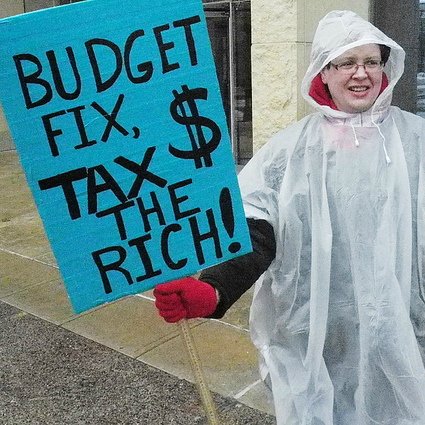BOB GARFIELD: Last Thursday, just a few weeks before the looming Fiscal Cliff, the nonpartisan Congressional Research Service, Congress’ authoritative source of objective policy analysis, released a potentially game-changing report. It rejected a fundamental dogma of the Republican Party, namely, that lower top marginal tax rates correlate with economic growth. Democrats trumpeted the findings at a press conference, while Republicans, like Orrin Hatch spokeswoman Antonia Ferrier, accused Democrats of, quote, “doing a bizarre victory dance.”
What’s really bizarre is that this is the second time the Congressional Research Service has released this report. The CRS actually withdrew it after it was first published in September, when Republican staffers accused it of using flawed methodology and partisan language. This new version, according to Roll Call Reporter Emma Dumain, basically draws the same conclusions. The only difference, she says, is that it further explains its methodology and softens some of the language that so irked the GOP.
EMMA DUMAIN: Instead of “Bush tax cuts,” we now see “Bush era tax cuts,” instead of “millionaires” we see “high income taxpayers.”
BOB GARFIELD: Is this the first time that CRS has been accused of partisanship or of incautious language?
EMMA DUMAIN: This was the latest in watershed moments for this agency. In 2004, a CRS analyst named Louis Fisher wrote an article for an outside publication that took a personal stance on the Iraq War. It did not side with Democrats or Republicans but it took a position on what was a very politically charged issue at the time. It sparked then CRS Director Daniel Mulhollan to issue a statement about the importance of behaving in a way that didn't call into question the nonpartisan nature of the CRS.
The last time we really saw this in the mainstream media, not just in the Beltway, was Morris Davis, who was a former Guantánamo Bay military commissions prosecutor, who was fired from the CRS in 2009, after writing a Wall Street Journal opinion piece that was critical of Obama's policy on detainees.
BOB GARFIELD: As far back as 1995, House Speaker Newt Gingrich tried to do approximately to the CRS and two other congressional research agencies what he tried to do with public broadcasting, not necessarily to zero it out but to cut them. You’ve suggested that the threat of budget cuts was chilling.
EMMA DUMAIN: That’s when analysts inside started to think about not offering robust deep heavy, um –
BOB GARFIELD: Analysis?
EMMA DUMAIN: Analysis, exactly but lists of facts.
BOB GARFIELD: But aren't these agencies chartered to do that analysis to draw policy conclusions, based on the available facts?
EMMA DUMAIN: That's what makes this so complicated. Our expectations for what the Congressional Research Service should be and what lawmakers would like it to be and what analysts see their role being are very much in conflict. And Tom Hungerford, the author of this report, denies that this report is in any way biased or partisan. But he does believe that he has a responsibility to do an analysis.
BOB GARFIELD: Seeing that the author, Hungerford, had made multiple campaign donations to [LAUGHS] the Democrats, can the CRS be nonpartisan, if its employees, and particularly the author of this report, are active party members?
EMMA DUMAIN: So I raised this question to analysts from the CRS, and they say: How dare anybody call into question my integrity as a professional and my ability to leave my politics at the door.
BOB GARFIELD: What amazes me, is that in its substance, it’s a blockbuster at repudiation of the supply side economics that the Republicans have depended on for several generations, and yet, what little coverage it's gotten has been about the withdraw and reissue, not about the conclusions, themselves. In short, whaa?
EMMA DUMAIN: The odds are stacked against us, I think, from the start. Because the report was removed and then reissued, it does have a very politically charged taint to it. So even if Democrats were to go around waving this, saying, look at this, look at what this does, you already had Republicans bashing not its findings so much as its very integrity.
BOB GARFIELD: Here we are, facing the Fiscal Cliff, where tax rates are at the very center of the debate. So, do you believe that the press missed something fairly titanic in the CRS's conclusions?
EMMA DUMAIN: The report's findings were made secondary to the brouhaha surrounding it. To their credit, Democrats tried very hard last week to make this not about the controversy surrounding the report. Sander Levin, who is the Michigan Democrat ranking member on the House Ways and Means Committee, he held a press conference when this was reissued last week with some of his senior Democratic counterparts.
And Chris VanHollen, the top Democrat on the Budget Committee, said this report drives a stake through the heart of Republican economic theory. They all said this report shows we must increase taxes on the wealthy, a plan that Americans essentially voted for in November. They tried. It was sparsely attended affair. Not a lot of press showed up. Not a lot of people wrote about it.
BOB GARFIELD: Emma, thank you very much.
EMMA DUMAIN: Thank you.
BOB GARFIELD: Emma Dumain is a reporter for Roll Call in Washington, DC.
[MUSIC UP AND UNDER]
